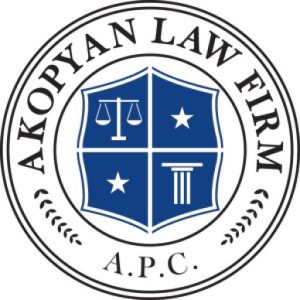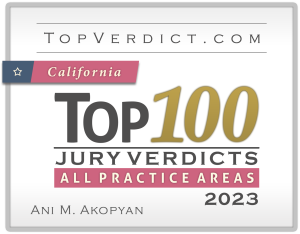Calabasas Employment Attorneys
The trial attorneys of the Akopyan Law Firm A.P.C. stand ready to fight for the rights of the residents of Calabasas, regardless of whether they are employees or employers. If your cause is just and involves employment law, give us a call to see how we can help.
 Calabasas, California
Calabasas, California
Calabasas is a city in the southwestern region of the San Fernando Valley in Los Angeles County. Calabasas is home to more than 25,000 residents. It covers approximately eighteen square miles, and encompasses the following zip codes: 90290, 91301, 91302, and 91372. Settlements of Chumash Indians named the area Calabasas, a word perhaps descended from the Indian word for “where the wild geese fly.” Others think Calabasas comes from the Spanish word for pumpkin or wild gourd. Spanish expeditions in the 1700’s forever changed the Indians’ way of life. The Diary of Miguel Costanso, which documents the Portola expeditions in 1769-1770, refers to encounters with the Chumash in the area. Six years later, the Juan de Anza party camped just west of Calabasas. El Scorpion, or El Escorpion, a ranch that once occupied a large tract in the west Valley, was granted to three Indians in Calabasas in the 1830’s. About 25 years later, Miguel Leonis, the Basque “King of Calabasas” acquired the ranch and 1100 acres by his marriage to Espiritu, an Indian who had inherited the property from her father. Leonis was often in trouble with the law, hiring gunmen to expand his lands, bribing witnesses and threatening nearby settlers. He was killed in 1889 when he fell from his wagon after removing a band of squatters from his property. Squatter wars and gun fights were a bloody part of Calabasas history. “Inhabitants killed each other off so steadily that a human face is a rarity,” wrote Horace Bell in his book on the old west coast. When large ranches were divided into farms in the late 1800’s, families of settlers struggled against poverty and drought. When water and power came to Owensmouth (Canoga Park), they were happy to leave the difficult life of Calabasas pioneers. After the turn of the century, several select spots in the Calabasas area developed into weekend respites from the city. What is now the Sagebrush Cantina was originally a group of small stores built by Lester Agoure, Sr. in the early 1920’s. The parking lot once was the local jail. Outside was the famous hanging tree, dead, but still standing today. It is the identifying logo of the Calabasas Chamber of Commerce. Lack of water in the Calabasas area was always a major concern. With the founding of the Las Virgenes Municipal Water District in 1958, a water supply was assured, and the area began its development boom. With offices in Los Angeles, Bakersfield, Oxnard, Temecula, Rancho Cucamonga, Costa Mesa, Culver City, and San Diego, the Akopyan Law Firm A.P.C. is just minutes away from Calabasas. Our employment lawyers stand ready to provide world-class services and top-notch representation to the residents of Calabasas.
Finding the Best Employment Lawyer in Calabasas Has Never Been Easier
Calabasas, as a thriving community, offers a plethora of legal professionals for its residents to consider. Conducting an online search for “employment lawyer Calabasas” or “wrongful termination attorney Calabasas” often inundates users with paid advertisements from employment lawyers based in various locations. Navigating this sea of choices to select the right attorney with the essential skills and experience can indeed be challenging when relying primarily on paid internet advertisements. For individuals in search of legal representation, assessing an attorney’s proficiency in handling employment trials and litigation can be a formidable task when their primary reference point is an advertisement. However, at the Akopyan Law Firm, A.P.C., each attorney brings nearly two decades of invaluable experience to the table. Our legal team boasts a well-established track record of success, effectively advocating for both employees and employers. Our firm’s guiding principle revolves around prioritizing quality over quantity. Instead of saturating the market with advertising, our attorneys dedicate their time to the courtroom, vigorously fighting for our clients’ rights. We understand that actions speak louder than words and wholeheartedly invite you to seek references from satisfied clients upon request. Additionally, you can explore our online reviews to gain added confidence in our capabilities. With conveniently located offices just minutes away from Calabasas, we are poised and prepared to provide top-tier legal representation to the residents of Calabasas, ensuring that their legal needs are met with the utmost level of expertise and professionalism. Your pursuit of justice begins here.
We Can Help Employees and Employers In Calabasas With:
Featured Article:
Wrongful Termination After Bodily Injury in California: Key FEHA Protections
📌 Key Takeaways If you were fired soon after a bodily injury, California’s FEHA may protect you. Here’s how to spot the issues and respond wisely: Disability-Based Firing Is Unlawful Under FEHA: Employers may not terminate you because of a physical disability, including temporary injuries that substantially limit major life activities. The Interactive Process Is Mandatory: Once an employer knows about your disability, they must engage in a timely, good-faith dialogue to explore reasonable accommodations rather than dismissing requests. Retaliation Is Prohibited: Penalizing or firing you for requesting accommodations, disclosing a disability, reporting discrimination, or participating in investigations can constitute retaliation under FEHA. Timing, Remarks, and Paper Trails Matter: Close timing to disclosure, discriminatory comments, sudden negative write-ups, and departures from policy may help establish a disability-related motive. Prepared, documented, and advised = stronger protection. For California employees recovering from bodily injuries and wondering whether a sudden termination crossed the line, these insights clarify core protections and what to discuss with an employment attorney. Losing a job after a bodily injury can be devastating. When termination follows soon after an employer learns of a physical disability —especially alongside remarks about health, ignored accommodation requests, or sudden performance write-ups—California’s FEHA may be implicated. In broad terms, the law generally provides that employers may not terminate workers because of a physical disability (see, e.g., Gov. Code § 12940). This overview helps readers recognize patterns that may indicate FEHA issues. It is not a step-by-step guide. For case-specific analysis, speak with a California employment attorney. What FEHA Generally Prohibits FEHA generally prohibits disability discrimination in employment (Gov. Code § 12940). Coverage includes private employers with five or more employees in California. A physical disability can include conditions that limit major life activities (e.g., walking, standing, lifting, bending, reaching). The concept may include: an actual disability, a record of disability, or being regarded as disabled. Temporary injuries may qualify when they substantially limit major life activities during their duration. Employer knowledge of functional limitations is often relevant to whether legal obligations are triggered (e.g., accommodation and the interactive process). Employer Conduct That May Indicate Problems The following indicators are illustrative, not exhaustive: Direct remarks about injuries, physical capability, or costs (e.g., “we need 100% healthy workers”). Close timing between disclosure of limitations or accommodation requests and termination. Sudden documentation of performance issues that begins only after injury disclosure. Departures from policy (e.g., skipping progressive discipline or applying standards inconsistently). Refusing to discuss accommodations or declaring “no accommodation available” without individualized assessment (see Gov. Code § 12940(n); verify current text). Example (hypothetical): A worker provides medical lifting restrictions. Within a week, the employer ends employment for “inability to meet job requirements” without exploring equipment, modified duties, or reassignment. Outcomes depend on facts and law; this example is for illustration only. The Interactive Process (Independent Obligation) California law expects a timely, good-faith interactive process to consider reasonable accommodations (Gov. Code § 12940(n)). A common structure is: Recognize limitations: Employer becomes aware of functional limits affecting... Read more









Millions of Dollars Recovered For Our Clients
Check Out Our Case Results



